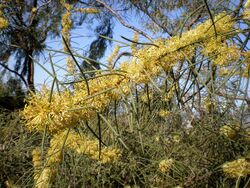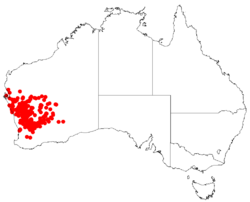Biology:Hakea recurva
| Jarnockmert | |
|---|---|

| |
| Hakea recurva in the Botanic Garden of Barcelona | |
| Scientific classification | |
| Kingdom: | Plantae |
| Clade: | Tracheophytes |
| Clade: | Angiosperms |
| Clade: | Eudicots |
| Order: | Proteales |
| Family: | Proteaceae |
| Genus: | Hakea |
| Species: | H. recurva
|
| Binomial name | |
| Hakea recurva Meisn.[1]
| |

| |
| Occurrence data from Australasian Virtual Herbarium | |
Hakea recurva, commonly known as jarnockmert,[2] is a flowering shrub or small tree in the family Proteaceae and is endemic to an area in the Mid West, northern Wheatbelt and the Goldfields-Esperance regions of Western Australia. It has creams-white to yellow flowers and thick, prickly, curved leaves.
Description
Hakea recurva is a tall shrub or small tree typically growing to a height of 1 to 6 metres (3 to 20 ft) and does not form a lignotuber. It is multi-stemmed with branchlets densely covered in fine, flattened, silky hairs and quickly becoming smooth. The fragrant inflorescence may have 20-40 large cream-yellow flowers in clusters in the leaf axils. The leaves may be straight or recurved ending with a sharp point. Flowering occurs from June to October and the fruit have a smooth surface, obliquely egg-shaped 1.7–2.3 cm (0.7–0.9 in) long and ending in broad short beak.[3]
Taxonomy and naming
Hakea recurva was first formally described in 1856 by Carl Meisner and the description was published in Prodromus Systematis Naturalis Regni Vegetabilis.[4][5] The specific epithet (recurva) means "curved", referring to the leaves.[6]
Distribution and habitat
Hakea recurva grows in open scrub or mulga on granitic loam, sand, sandy-clay, gravel and laterite. Occurs in area bounded by the Murchison River, Laverton and Israelite Bay.
There are two subspecies:
- Hakea recurva subsp. arida[7] The leaves are generally 4 cm (1.6 in) long and 1.2–1.6 mm (0.047–0.063 in) wide. The overlapping flower bracts 2–3.5 mm (0.079–0.138 in) long, smooth, reddish coloured with a light brown rounded rim. The pedicels 4.5–8 mm (0.18–0.31 in) long and the gland 0.2 mm (0.0079 in) high.[8]
- Hakea recurva subsp. recurva[9] The leaves are 5–12 cm (2.0–4.7 in) long and 2–3.2 mm (0.079–0.126 in) wide. The over-lapping flower bracts 4–7.5 mm (0.16–0.30 in) long and pale coloured. The pedicels 8–13 mm (0.31–0.51 in) long and the gland 0.8–1 mm (0.031–0.039 in) high.[10]
References
- ↑ "Hakea recurva". https://biodiversity.org.au/nsl/services/apc-format/display/97551.
- ↑ Abbott, Ian. "Aboriginal Names for Plant Species in South-Western Australia". Kippleonline. http://www.kippleonline.net/bobhoward/plantsframe.html.
- ↑ "Hakea recurva". FloraBase. Western Australian Government Department of Parks and Wildlife. https://florabase.dpaw.wa.gov.au/browse/profile/2199.
- ↑ "Hakea recurva". APNI. https://id.biodiversity.org.au/instance/apni/522803.
- ↑ "Hakea recurva". https://www.biodiversitylibrary.org/item/109211#page/400/mode/1up.
- ↑ Sharr, Francis Aubi; George, Alex (2019). Western Australian Plant Names and Their Meanings (3rd ed.). Kardinya, WA: Four Gables Press. p. 292. ISBN 9780958034180.
- ↑ "Hakea recurva subsp. arida". APNI. https://id.biodiversity.org.au/instance/apni/558779.
- ↑ "Hakea recurva subsp. arida". http://www.flora.sa.gov.au/efsa/lucid/Hakea/key/Australian%20Hakea%20species/Media/Html/Hakea_recurva_ssp._arida.htm.
- ↑ "Hakea recurva subsp. recurva". APNI. https://id.biodiversity.org.au/instance/apni/558778.
- ↑ "Hakea recurva ssp. recurva". http://www.flora.sa.gov.au/efsa/lucid/Hakea/key/Australian%20Hakea%20species/Media/Html/Hakea_recurva_ssp._recurva.htm.
Wikidata ☰ Q18083927 entry
 |

